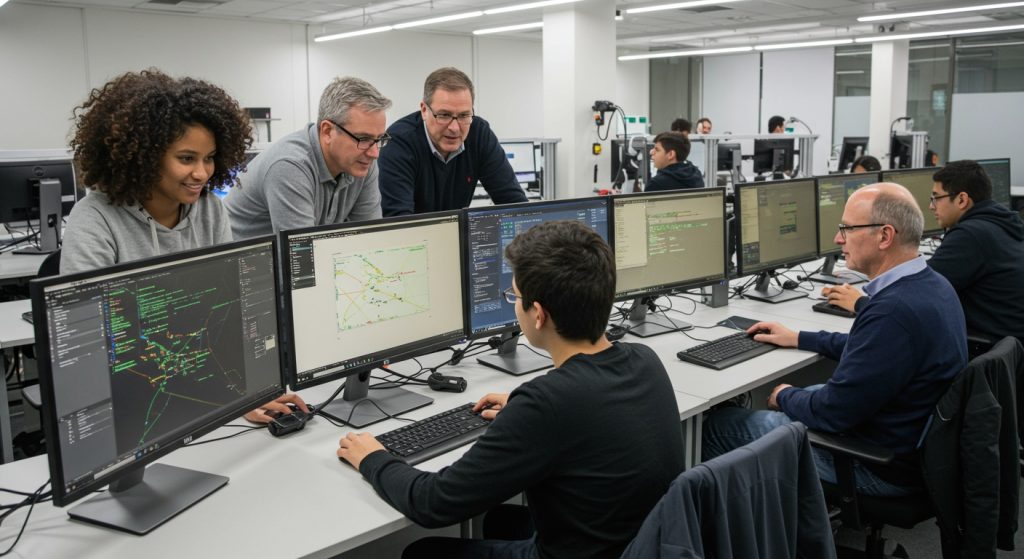Introduction
Ever scrolled through your phone, amazed by the intricate dance of algorithms predicting your next click? I certainly have. That fascination ignited a burning question: how do these systems actually work? This sparked my deep dive into the world of computer science, a journey that revealed a critical need: bridging the gap between academic learning and real-world application. This exploration led me to a powerful solution: universities with strong industry partnerships. These programs offer a unique learning experience, weaving together theoretical knowledge with practical skills demanded by today’s top tech companies. Join me as we explore this dynamic landscape and discover how these partnerships are shaping the future of computer science.
Bridging the Gap: Computer Science Universities with Strong Industry Partnerships
The Evolving Landscape of Computer Science Education
The computer science field is dynamic, constantly evolving with emerging technologies like AI, cybersecurity. Data science. Traditional academic learning must be complemented with practical experience to prepare graduates for this fast-paced world. This is where university-industry partnerships come into play, providing students with a crucial edge.
Powerhouse Institutions and Their Industry Alliances
Several universities have forged strong ties with industry giants, creating a symbiotic relationship that benefits both students and companies. MIT, for example, collaborates with companies like IBM and Google on research projects and offers students internship opportunities. Carnegie Mellon University’s partnerships with Amazon and Microsoft provide students access to cutting-edge technologies and real-world problem-solving scenarios. Stanford University, located in the heart of Silicon Valley, enjoys close ties with numerous tech companies, fostering a vibrant ecosystem of innovation. Similarly, the University of Oxford’s partnerships with companies like DeepMind provide students with unique opportunities in AI research. For those interested in exploring UK universities with data science industry links, you might find this resource helpful: Master’s in Data Science: UK Universities with Industry Links.
Program Features and Specialized Tracks
Universities with robust industry partnerships often offer specialized programs co-developed with industry experts. These programs might focus on areas like machine learning, cybersecurity, or fintech, ensuring students acquire in-demand skills. These partnerships often lead to the creation of specialized labs and research centers on campus, providing students with access to state-of-the-art equipment and mentorship from industry professionals.
Career Pathways and Outcomes
Industry partnerships significantly enhance career prospects for computer science graduates. Internships, co-op programs. Mentorship opportunities provide invaluable experience and networking opportunities. These connections often translate into job offers upon graduation, placing graduates at the forefront of technological advancements. Moreover, industry collaborations expose students to current industry challenges and trends, preparing them for the realities of the professional world.
Navigating the Application Process
Applying to universities with strong industry ties often requires showcasing a genuine interest in practical application and innovation. A strong academic record, relevant extracurricular activities. A compelling statement of purpose demonstrating alignment with the university’s industry focus are key components of a successful application.
Pro Tips: Maximizing the Benefits of Industry Partnerships
Actively seek out internship opportunities offered through university partnerships. Participate in industry-sponsored hackathons and competitions. Network with industry professionals at university events. Tailor your resume and cover letter to highlight relevant skills and experiences.
Beyond the Classroom: The Value Proposition
University-industry partnerships offer more than just academic learning. They offer a bridge to the professional world, fostering practical skills, industry connections. A competitive edge in the job market. This collaborative approach ensures computer science graduates are not only well-versed in theoretical concepts but also equipped with the practical experience to thrive in a rapidly changing technological landscape.
Conclusion
Choosing a computer science program strategically involves considering industry partnerships. These collaborations offer invaluable real-world experience, mentorship opportunities. Often a direct pathway to employment. Think about the burgeoning field of cybersecurity – universities partnering with firms like Palo Alto Networks offer students an edge. Key benefits of these partnerships include:
Enhanced curriculum relevance
Internship possibilities
Networking opportunities
Cutting-edge research exposure Look beyond the basic curriculum. Seek programs with active industry engagement, potentially even tailored specializations developed with industry leaders. This proactive approach sets the stage for a successful and fulfilling career in computer science. Resources like those available on BigUniversities. In can provide further insights into specific program offerings and industry connections. Embrace these opportunities and shape your future in this dynamic field.
FAQs
Why should I care about a university having industry partnerships for computer science?
Good question! Industry partnerships can open up a world of opportunities. Think internships at cool companies, getting your hands dirty with real-world projects before you even graduate. Even having a potential job lined up before you toss that graduation cap. Plus, the curriculum is often shaped by what’s actually happening in the industry, so you learn relevant skills.
What kinds of partnerships are we talking about here?
It can vary! Some universities partner with tech giants (think Google, Microsoft, Amazon), while others might work with local startups or specialized firms. Partnerships can involve research collaborations, guest lectures from industry pros, sponsored projects. – you guessed it – internships and job placement programs.
So, how do I find universities with strong industry connections?
Do some digging! Look at university websites – often they’ll brag about their partnerships (rightfully so!).Also, check out program-specific pages for computer science. Don’t be afraid to reach out to current students or alumni on LinkedIn and ask about their experiences. They’ll give you the inside scoop.
Is it all sunshine and roses with these partnerships? Any downsides?
Well, mostly good stuff. A tiny potential downside could be a curriculum that’s too focused on specific technologies used by partner companies. While practical, it might limit your exposure to broader computer science concepts. Just something to be mindful of!
Are these partnerships mainly for undergrads, or can grad students benefit too?
Definitely for grad students too! Industry partnerships often fund research projects, offer specialized workshops. Provide networking opportunities that can be incredibly valuable for grad students looking to specialize or get into a particular field.
Do all CS programs with industry ties cost more?
Not necessarily. Industry partnerships aren’t directly tied to tuition costs. But, universities with strong programs and lots of resources might have higher tuition in general. Best to check each university’s financial aid options and scholarship opportunities.
You mentioned internships… Are these guaranteed if a university has partnerships?
Sadly, no guarantees in life (except death and taxes, right?).While partnerships increase your chances of snagging a sweet internship, it’s not a sure thing. You’ll still need to apply, interview. Impress the recruiters.



